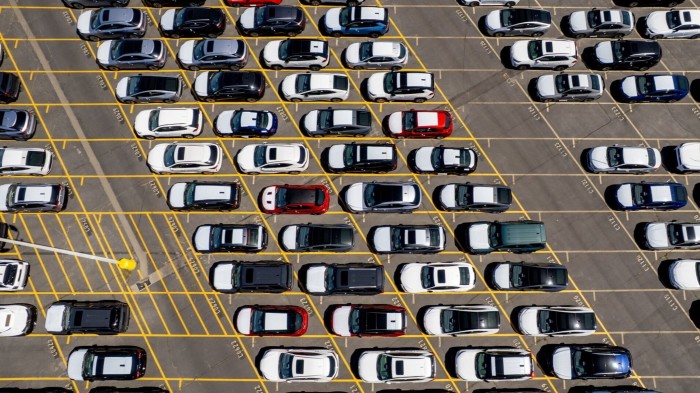Unlock the White House Watch newsletter for free
Your guide to what the 2024 US election means for Washington and the world
Shares of global carmakers rose on Tuesday after Donald Trump signalled there would be “help” for the industry, in a climbdown from the steep tariffs he imposed on imported cars.
“I’m looking at something to help some of the car companies,” the US president said on Monday in Washington, adding that automotive manufacturers “need a little bit of time” before they can start making parts in the US rather than in countries such as Canada and Mexico. Japanese groups are the largest car producers in Mexico.
Shares in Toyota and Honda rose 4.8 per cent and 4 per cent, respectively, on Tuesday following Trump’s comment. India’s Tata Motors gained 4.5 per cent and Korea’s Hyundai Motors rose 4.4 per cent. Shares in Stellantis rose 4.3 per cent, while shares in Volkswagen, Mercedes-Benz and BMW were up more than 2 per cent. Aston Martin also rose 3.5 per cent.
Despite Tuesday’s gains, Trump’s tariff threats have badly hit the shares of some carmakers and thrown into uncertainty the globalised supply chains that underpin the industry.
Shares in Toyota, the world’s largest car company by sales, are down 23.4 per cent this year compared with a 10.6 per cent decline in Japan’s Topix benchmark. The US president’s trade war has led Jaguar Land Rover and other carmakers to halt shipments or hold their cars in ports, while Stellantis has suspended production at plants in Mexico and Canada.
Trump’s statement marks his latest climbdown from the 25 per cent tariffs he imposed on all imports of foreign cars on April 2 excluding some exemptions for Mexico and Canada.
On Friday, the administration also exempted Chinese smartphone imports from the 125 per cent levy announced last week before later warning these products would be examined as part of a probe into semiconductors, which face separate tariffs.
Carmakers have been lobbying hard, particularly for changes to the 25 per cent levies on parts, which are set to be implemented from May 3.
They have warned that the tariffs on parts could be particularly damaging for the industry as these are sourced from all over the world, even for vehicles that are assembled in the US, and some components cannot be manufactured in the US.
“It will be incredibly costly, unnecessary and counter-productive to the policy aims of the administration to impose tariffs on those sundry parts for which there is no US supply chain,” a senior automotive executive said, citing examples such as hoses, tubes and wiring.
The executive said carmakers were encouraged by Trump’s remarks but added: “The billion dollar question is, what is it going to look like in a few weeks?”
When asked about additional tariff reprieves, Trump said: “I’m a very flexible person. I don’t change my mind, but I’m flexible.”
Analysts at S&P Global on Tuesday said they expected 700,000 fewer cars to be sold in the US this year — one of the largest forecast adjustments since the 2008 financial crisis and the Covid-19 manufacturing pause.
US manufacturing was likely to take a bigger hit, analysts warned, as they projected a decrease of 1.28mn cars this year, with further declines anticipated in the next two years.
Analysts at Bernstein called the tariffs a “major threat” to Japanese automakers, predicting a ¥5.5tn ($38.3bn) hit to revenues and a ¥3.7tn blow to profits even after accounting for mitigation efforts such as raising vehicle prices and selling fewer cars.
Given that it took the first Trump administration 16 months from initial consideration of auto tariffs to its final decision to not impose them, the analysts said they expected concerns over car tariffs to persist.


